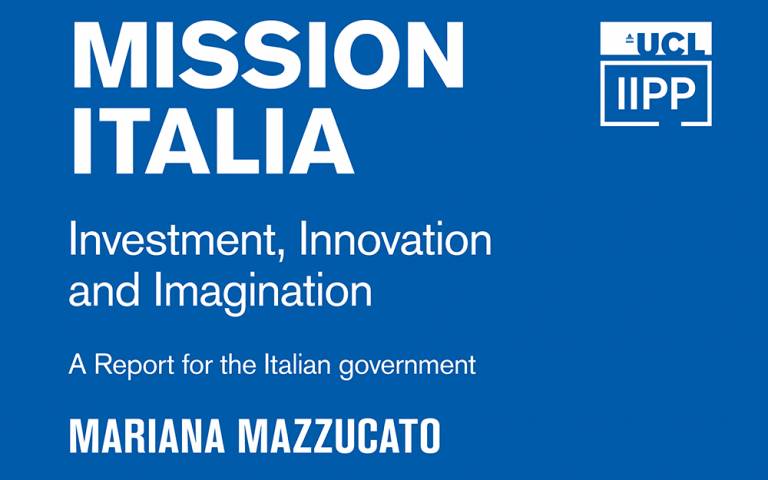New IIPP Report for the Italian Government - Mission Italia: Investment, innovation and imagination
20 November 2020
Professor Mariana Mazzucato has been working as Economic Advisor to the Italian PM Giuseppe Conte, and has written a report “Missioni Italia” (“Mission Italia”), where the mission-oriented approach is outlined with regard to the national dimension of policymaking.

The pandemic crisis and its socio-economic consequences require a different approach to economic policy-making. The mission-oriented framework, implemented at the national level, can play a key role in relaunching and reshaping the post-Covid economy.
In her role as Economic Advisor to the Italian PM Giuseppe Conte, Professor Mariana Mazzucato has written a report “Missioni Italia” (“Mission Italia”), where the mission-oriented approach is outlined with regard to the national dimension of policymaking. The report was presented to the PM Giuseppe Conte on August 4th in Rome. An IIPP launch event for the “Missioni Italia” report will be held in December.
The focus of this report is on Italy, yet its policy implications could be easily adapted and extended to other similar advanced economies.
Mission Italia proposes a mission-oriented approach to policy-making for Italy – the country is taken as an example but the framework can easily be adapted to other countries. It first outlines the principles of mission-oriented policymaking, which are at the core of the work that Professor Mazzucato has done with European Commission, presented in "Mission-oriented research & innovation in the European Union" (2018) and in "Governing Missions" (2019).
The Mission Italia Report then proposes three examples of where this approach could be applied in Italy. These areas are the digital transformation, the green transition at the city level and the health system.
First, the mission around digital transformation stems not only from the importance to tap into the correspondent industrial sectors, but it also has a strong social aim as we experienced during the pandemic that a lack of digital competences and tools enlarge the so-called digital divide.
Second the mission around the green transformation reflects the urgency to shift the socio-economic model towards a sustainable one, particularly the Report proposes a mission at the city level, bringing into the discussion the target unit (state, region, city) for the design and implementation of mission.
Third, but most importantly, the Report presents a mission on Health, whose centrality for citizens’ wellbeing and right to health became even more important during the pandemic. These are three examples thought for the Italian context, it is interesting to see how the interrelate. For example, the first digital mission is, indeed, a cross-cutting one, as enhancing the use of digital technologies could make some production processes less polluting. Similarly, the introduction of telemedicine would considerably improve the health of the population.
Lastly, the Report focuses on complementary cross-cutting issues, such as the existence of different systems of innovations, the relationship between public and private actors and the strategic role of public procurement. The latter leads to the opportunities provided by a dynamic public administration that necessitate of new, digital and continuously updated skills.
 Close
Close

